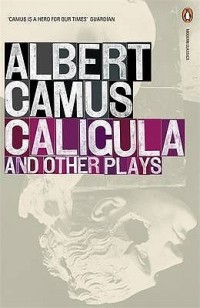
Caligula and Other Plays
تأليف : Albert Camus
النوعية : مجموعة قصص
نعتذر، هذا الكتاب غير متاح حاليًا للتحميل أو القراءة لأن المؤلف أو الناشر لا يسمح بذلك في الوقت الحالي.
حفظ
Caligula and Other Plays by Albert Camus Caligula; Cross Purpose; The Just; The PossessedCaligula reveals some aspects of the existential
notion of 'the absurd' by portraying an emperor so mighty and so desperate in his search for freedom that he inevitably destroys gods, men and himself.The dramatic impetus of Cross Purpose, however, comes from the tension between consent to and refusal of man's absurdity; it is Caligula; Cross Purpose; The Just; The PossessedCaligula reveals some aspects of the existential notion of 'the absurd' by portraying an emperor so mighty and so desperate in his search for freedom that he inevitably destroys gods, men and himself.The dramatic impetus of Cross Purpose, however, comes from the tension between consent to and refusal of man's absurdity; it is the tragedy of a man who returns home to his mother and sister without revealing his identity to them. By the time of The Just and The Possessed, refusal and rebellion have taken over, and in these overtly political plays (the latter based on Dostoyevsky's The Devils) Camus dramatizes action and revolt in the name of liberty.
Caligula and Other Plays by Albert Camus Caligula; Cross Purpose; The Just; The PossessedCaligula reveals some aspects of the existential
notion of 'the absurd' by portraying an emperor so mighty and so desperate in his search for freedom that he inevitably destroys gods, men and himself.The dramatic impetus of Cross Purpose, however, comes from the tension between consent to and refusal of man's absurdity; it is Caligula; Cross Purpose; The Just; The PossessedCaligula reveals some aspects of the existential notion of 'the absurd' by portraying an emperor so mighty and so desperate in his search for freedom that he inevitably destroys gods, men and himself.The dramatic impetus of Cross Purpose, however, comes from the tension between consent to and refusal of man's absurdity; it is the tragedy of a man who returns home to his mother and sister without revealing his identity to them. By the time of The Just and The Possessed, refusal and rebellion have taken over, and in these overtly political plays (the latter based on Dostoyevsky's The Devils) Camus dramatizes action and revolt in the name of liberty.
المزيد...



